- Home
- Scott Kenemore
Lake of Darkness Page 3
Lake of Darkness Read online
Page 3
Flip did not. The expression on his face showed it. Thompson sighed and took a cigar from his jacket pocket. He bit off the tip, lit the end, and took several puffs.
“The world is changing, Mr. Flippity,” declared the mayor. “We stand now in times without precedent or analog. Not in this country; not in the world. Negroes will make this city, officer. And that is not election talk. Negroes from all across the former Confederacy are moving here, to this new Mecca, in numbers that will change who and what we are forever. A man can understand that . . . or he can become lost to history. How do you think I beat Sweitzer, that Democrat, to become mayor? We were not so different, he and I. Not really. But I understood the future. I grasped that immigrants to this city are a boon. A positive boon! If we continue to grow like this, we may eclipse even New York. Imagine it!—Chicago, the nation’s de facto capital. A capital with a populace that includes men and women of race. It will be so. It must be so! I will not allow a madman to stop it.”
Flip nodded seriously.
“But word travels quickly,” the mayor continued. “Faster than it ever has. The telegraph. The telephone. They tell me that soon we will be broadcasting our words—my words—through the naked air, with receivers in every home. Our train porters already carry Chicago’s newspapers to every city in the South. No . . . make that every city in the United States. There, they are read and re-read. And if word circulates that Chicago allows its most vulnerable newcomers to be killed and mutilated without consequence. . . that those who have already endured so much should find here, not sanctuary, but slaughter and horror. . . Well, it does not serve my purposes.”
The mayor drew on his cigar thoughtfully. He glanced once more at the photographs on the table and smiled.
“In my idle moments—purely as a distraction, you understand—I have attempted to imagine the mind of someone who would do such things as these,” the mayor said, nodding at the grisly pictures. “And all that I have been able to discern . . . is that this is his goal.”
A beat passed.
“That what is his goal, Mister Mayor?” Flip asked carefully.
“Why, to kill the city itself!” said the mayor. “To reverse our growth. Our prosperity. To see that a man like me, who ran and won with the help of Negro votes—and woman votes, and Italian votes, come to’t!—is never elected again. He intends that word of his murderous deeds should spread far and wide, and undo our progress. So, plainly, we are in a race against him. We must stop him. More specifically, you must. The city has called for assistance, officer. Will you answer?”
Flip managed a small nod.
The mayor grinned like a Cheshire cat and extinguished his cigar.
“I will expect a status report in one week,” the mayor told him. “You are relieved of all other responsibilities until then. Your lieutenant has already been informed.”
“Yes,” Flip said, attempting to conceal the extent of his bewilderment.
“I will see you again, right here, in seven days,” the mayor told him. “I expect progress. The city expects progress.”
“I . . . yes . . .” Flip said.
With no further ceremony, the mayor threw the white envelope and the slip of paper onto the green table and walked away. He passed into the shadows at the edge of the room, and out through a door that Flip could not see. The ox-like man emerged from the darkness and began to gather the paper and photographs. He placed them into the envelope, folded it shut, and thrust it into Flip’s chest. All the while, the man smiled a murderous, demented smile, his eyes gleaming in the glow of the electric light.
“We should go now,” Crespo whispered urgently. “Put those pictures inside your coat. And tell this man here what you need—whatever you need—to get the job done.”
Flip did.
TWO
The next day was Wednesday.
Flip had not slept well or extensively. In the predawn gloom, he waited on the steps of the Church of Heaven’s God in Christ Lord Jesus—an imposing stone structure set back on a boulevard along South Michigan Avenue. Formerly a synagogue, in recent years it had been converted into one of the largest black churches on the South Side of Chicago. Flip smoked a cigarette as he waited, and shifted his weight back and forth on his feet. In the bluish chill of morning, it was almost cool enough for his coat.
A group of tradesmen passed. They regarded him carefully, but stayed silent. A man who appeared vagrant and insane sauntered along behind them, clearly with no destination in mind. He wore canvas bags on his legs instead of trousers. Flip stared him down hard when he began to linger, and the man moved off.
A few moments later, in the far distance at the end of the boulevard, the pastor came into view. He wore black from head to toe, and walked slowly, purposefully. He had small glasses with round, wire eyepieces. He was about fifty years old. His short-cropped hair had halfway gone to gray.
Flip, who did not regularly enjoy tobacco, quickly extinguished his smoke.
“Oh my word, it’s Joe Flippity,” the pastor said when he edged onto church property, as if galvanized to speech by the holy soil underfoot. “Tell me you’re not here with more bad news, Flip. My flock has had about all it can take.”
Flip stared straight ahead for a moment and blinked rapidly. His mind searched for alternative answers, but found none. There was nothing but the truth.
“Here about the Whitcomb boys,” Flip said.
The pastor frowned and shook his head. Flip could smell the man’s bergamot aftershave on the wind.
“The Whitcomb boys come into the world at the same time, and God took them away at the same time,” the pastor pronounced. “What do you think of that? Coincidence? No sir. Providence. Like Jacob and Esau. Of course, Jacob and Esau would be fathers of nations. The Whitcomb boys were too young to be fathers of anything, bless them. Still pure. Still innocent.”
To Flip, the Whitcomb boys had certainly looked old enough to get girls pregnant, or at least to make themselves come. But Flip did not say this to the pastor.
“How much do you know about what happened?” Flip asked. “About what actually happened to those boys?”
The pastor looked up and down the dark street. The sun began to peek over building-tops. Dogs barked, asking to be fed. Seagulls, hovering along the coast of Lake Michigan, pierced the air with crooked cries.
“You know I can’t talk to you, Flip,” the pastor said in a low voice that pled for mercy. “They said they’d shut me down. My work. My ministry. All this. We about the largest congregation on the South Side now, and they don’t give a damn. White policemen said this, Flip.”
“I’m an honorary white policeman this morning,” Flip replied sternly. “I met with the mayor last night. Far as you know, I have blond hair and blue eyes.”
As if on cue, a strange distant buzzing arose.
Flip and the pastor looked north along the avenue, now dappled in sunny orange rays. As the sound drew closer, it changed, gradually, from a buzz to a mechanical thump. A motorized bicycle appeared. It was painted army green, and had the words “Royal Enfield” stenciled across the gas tank in stark white. The device pulled to the steps of the church and fell silent. The pastor took his fingers out of his ears.
The driver stepped off and carefully removed a leather helmet, revealing a white man in late middle age. A metal star was pinned to his pocket. The man hesitated—looked back and forth between Flip and the pastor—and then took a small envelope out of his coat. Flip raised a hand, indicating to the officer that he had found his target.
“From the city,” the man said to Flip, proffering the envelope. “It’s everything you asked for.”
“Thank you,” Flip replied.
The officer lingered.
“I just want to say. . . We sure are counting on you. My cousin, she got twin girls at home.”
Flip nodded seriously. The officer nodded back. Then he restarted the Enfield and pulled away.
The pastor looked back at Flip, calculating.
/>
“They killing white twins too?”
“Not yet,” Flip said, rubbing his jaw. “I expect they want me to stop it here, before it can move north.”
They watched the departing motorbike until it was out of sight.
“Shall we retire to my offices?” asked the pastor.
“Please,” Flip said.
“It has not even been a week,” the pastor declared, easing into the high-backed chair behind his oak desk. The desk was empty save for three polished rock paperweights and a Bible. The pastor lit a series of candles. He placed some on the immense desk, and others on a window ledge beside them.
Flip put the small envelope the courier had brought into the left side of his jacket, tucking it in tight. Then, reaching into the right side of his jacket, he produced the much larger envelope from the night before.
For a moment, Flip perused the photos along with the written text, scant as it was.
“The Whitcomb boys were found at home,” Flip said.
The pastor nodded sagely, his eyes magnified by his lenses and his stare given weight by the candlelight.
“In their own house, this happened,” the pastor said. “Their mother. . .”
“Gladys,” Flip said.
“Yes, Gladys,” the pastor confirmed. “She has. . . She finds herself unable to sleep most nights. This was before the murders. A strange feeling compels her to move her legs. So she walks around her block. She does this from about one in the morning until three or four, like clockwork. I’ve told her it isn’t safe—for a woman to be out so late—but she pays me no mind. Last Tuesday she returned home nearer to five than to four. Nothing in the house looked disarranged, she said. All seemed in order, so she returned to her own bed. Then, perhaps an hour later, she woke again and went to rouse the boys. That was when she found . . . well, it seems you have a photograph.”
“I do,” Flip said. “But that doesn’t mean I have all the details. When did you talk to her last?”
“She came to me straight after it happened,” the pastor told the policeman. “In fact, I believe I was the only person with whom she spoke . . . before the white officers instructed her to be silent. They instructed me to be silent as well. Insisted on it. They said silence would help the investigation.”
The pastor’s expression told Flip he was not sure about this.
“Maybe it will,” Flip replied. “I’ve got to ask you some questions now, pastor. They are routine, but sometimes they help.”
“Yes, of course,” the pastor said.
Flip took a lead pencil and a notebook out of his pocket. He began to write, even before the pastor had spoken.
“Gladys had no enemies,” Flip said. “She was loved in the community, yes? She was involved in no scandals. A good, churchgoing woman. She and her husband had moved here with the triplets around a year ago. From Texas.”
“Yes,” the pastor said. “All of that’s right as rain.”
“And the father of the boys . . .” Flip said. “He’s no longer around?”
“Fell off a boxcar in a rail yard and died,” said the pastor. “That was four or five months ago, though it feels like I just did the service.”
Flip looked up from his notepad and squinted.
“A boxcar fall?”
“The physician said a clot of blood formed in his leg and traveled to his brain,” the pastor explained. “The man had no insurance on his life. There’s something of an informal railroad workers group in the neighborhood. They’ve been helping Gladys with money. So have we, to tell you plainly. The triplets were. . . let’s see. . . they were twelve years old. Gladys knew they would need to go to work soon without a daddy. Help provide. But with what’s happened now. . .”
The pastor paused a moment.
“It’s going to kill her. You know that, right? Whether you catch the man who did this or not . . . It’s going to literally kill her dead.”
“Yes,” said Flip. “I know. But—with all due respect to Gladys Whitcomb—saving her isn’t what this is about.”
The pastor nodded grimly.
“The boys,” Flip continued. “They had no enemies?”
The pastor shook his head.
On the desk before them, a candle spat and sputtered, as if acknowledging a half-truth had been told.
“Course. . . folks always looked at ’em strange,” the pastor added quickly, glancing down at the candle. “On account of their being so exactly alike, I mean. I always tried my best to put a stop to it—whenever I saw the gawkers—and that’s God’s honest truth. I told members of my flock: ‘Don’t you look at those boys as if they’re strange. God made them that way! God has a plan for them, same as he does for you. A reason. They might look identical. They might be identical, down to the hairs on their head. But they’ve got three different souls. And God loves each one of those souls.’ I told people that.”
Flip nodded and wrote.
“But some people. . .” the pastor trailed off. “Yes, some people still made comments. Said things. I’d stop it when I heard it, but I couldn’t stop it all.”
“I’m sure you did everything you could,” Flip affirmed, without looking up from his notepad. “Tell me, did the boys ever come to you about the gawking? Or did they ever say people might have threatened them?”
The pastor shook his head no.
“You think Gladys would talk to me?” Flip asked, putting his pencil away.
The man of God shrugged.
“She might,” he said. “Talk to her soon, though. That’s my advice. She isn’t. . . This job, Flip. You get to know when someone ain’t long for this world. And she ain’t. You might not do it today, but do it tomorrow then. I won’t be surprised if she passes before the end of the week.”
“Thank you,” Flip said, nodding. “I intend to seek her out directly. I’ve taken enough of your time. Good morning.”
“Flip, you got to catch whoever did this,” the pastor said as both men rose. “The mind of someone who could do such things . . . I can’t fathom it.”
The candle on the table sputtered once more.
Flip looked down at it. The pastor did too.
Then Flip buttoned his coat and departed.
Back on the steps of the church, Flip ducked behind a pillar and made sure he was unobserved. Then he carefully opened the small envelope that had come by motorbike. Inside was more money than he had ever seen in his life. Precisely what he had asked for. Ten thousand in hundred dollar bills.
Flip carefully extracted a single note and examined it in the morning sunlight. Benjamin Franklin was on the front, and some kind of Ancient Greek orgy was happening on the back. The bill was crisp and fresh. He had no doubt that it was real. Flip had grown talented at spotting forgeries and counterfeits. Some in Chicago’s underworld could draw passable $50s and $100s by hand.
Flip replaced the money and put the envelope back into his pocket.
It was enough to run away with. You could head back down south and buy your own piece of land with that. Nice big farmhouse. Work for yourself. No boss. No police hierarchy. Start all over. Change your name, and probably they never catch you.
Flip forced himself not to think about the new possibilities radiating out from the firm, white envelope now only millimeters from his heart.
If anything, the appearance of the ten thousand signified to Flip that his encounter with the mayor the night before had not—at least entirely—been an imagined fever-dream. This was real and happening. The city did need this case solved. So much so that they had actually given him the budget to do it.
The thought was equal parts sobering and terrifying.
The sun was higher now; it was evident the day would be hot. More commuters hustled to and fro along the avenue. Some just plain hustled. Peddlers pushed carts in the direction of the Loop. Working men walked together in groups carrying lunch pails, on their ways to factories or slaughterhouses. Shopkeepers hurried to open their stores. Unattended children played or ran ab
out aimlessly.
Flip stepped off of church property and made his way into the gathering throng.
The Whitcomb residence was a fifteen-minute walk from the Church of Heaven’s God in Christ Lord Jesus, on the upper level of a slate-grey two flat. The entire block was composed of buildings so similar that Flip repeatedly had to check the address and house number to make sure he’d got it right. He did not know if Gladys Whitcomb would be awake at this hour, but he climbed to her door and hammered away—giving the loud, pitiless knock he used to rouse suspects.
The thing that opened the door—the thing that had been Gladys Whitcomb—was not alive in any real sense of the word. She was like a zombie. A creature made to walk beyond any natural ability to do so. An etherized person on a table—hung somewhere between life and death, but closer to death. A cadaver momentarily propped upright for the amusement of the medical students.
Flip knew better than to waste a zombie’s time.
He flashed his badge and identified himself. Gladys Whitcomb took a few long moments to focus her eyes, her glassy stare slowly creeping up Flip’s leather jacket to his face. Flip found himself dreading the full force of her gaze as one might a physical blow. When her eyes did meet his own, it was more horrible than he had expected.
For this had once been a human. Only one week ago. One week.
“Ma’am, I hope to come in and speak to you,” Flip said clearly, trying not to wince under her gargoyle scowl. “We’ve met once or twice before, if you remember. Or maybe you don’t. We’re trying to catch the man who did this thing. Trying to make sure he can’t do it again. Do you understand me?”

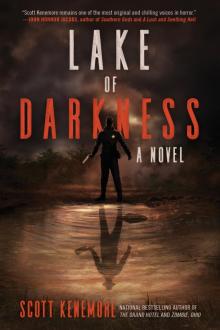 Lake of Darkness
Lake of Darkness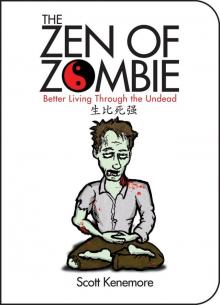 The Zen of Zombie
The Zen of Zombie Zen Of Zombie (Zen of Zombie Series)
Zen Of Zombie (Zen of Zombie Series)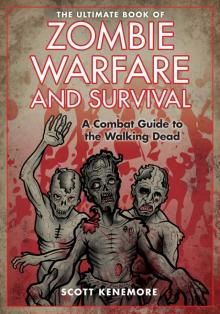 The Ultimate Book of Zombie Warfare and Survival
The Ultimate Book of Zombie Warfare and Survival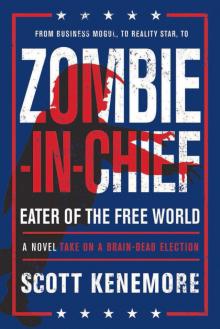 Zombie-in-Chief
Zombie-in-Chief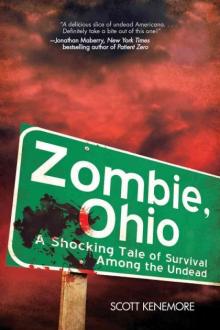 Zombie, Ohio
Zombie, Ohio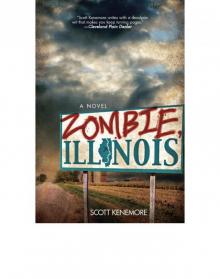 Zombie, Illinois
Zombie, Illinois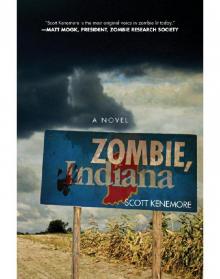 Zombie, Indiana
Zombie, Indiana